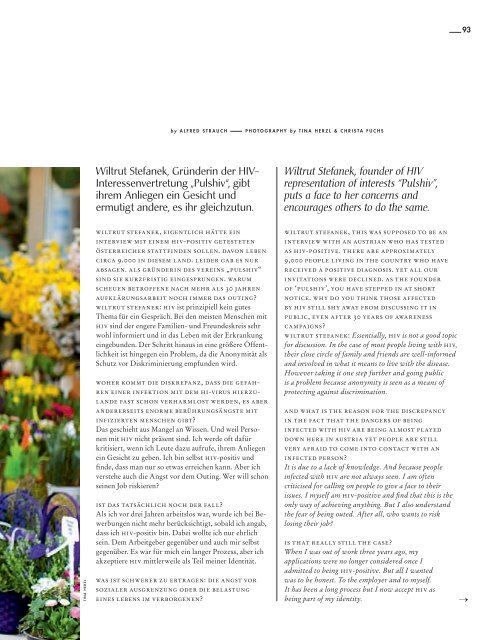Create successful ePaper yourself
Turn your PDF publications into a flip-book with our unique Google optimized e-Paper software.
93<br />
by alfred strauch<br />
Photography by tina herzl & christa fuchs<br />
tina herzl<br />
Wiltrut Stefanek, Gründerin der HIV-<br />
Interessenvertretung „Pulshiv“, gibt<br />
ihrem Anliegen ein Gesicht und<br />
ermutigt andere, es ihr gleichzutun.<br />
wiltrut stefanek, eigentlich hätte ein<br />
interview mit einem hiv-positiv getesteten<br />
österreicher stattfinden sollen. davon leben<br />
circa 9.000 in diesem land. leider gab es nur<br />
absagen. als gründerin des vereins „pulshiv“<br />
sind sie kurzfristig eingesprungen. warum<br />
scheuen betroffene nach mehr als 30 jahren<br />
aufklärungsarbeit noch immer das outing?<br />
wiltrut stefanek: hiv ist prinzipiell kein gutes<br />
Thema für ein Gespräch. Bei den meisten Menschen mit<br />
hiv sind der engere Familien- und Freundeskreis sehr<br />
wohl informiert und in das Leben mit der Erkrankung<br />
eingebunden. Der Schritt hinaus in eine größere Öffentlichkeit<br />
ist hingegen ein Problem, da die Anonymität als<br />
Schutz vor Diskriminierung empfunden wird.<br />
woher kommt die diskrepanz, dass die gefahren<br />
einer infektion mit dem hi-virus hierzulande<br />
fast schon verharmlost werden, es aber<br />
andererseits enorme berührungs ängste mit<br />
infizierten menschen gibt?<br />
Das geschieht aus Mangel an Wissen. Und weil Personen<br />
mit hiv nicht präsent sind. Ich werde oft dafür<br />
kritisiert, wenn ich Leute dazu aufrufe, ihrem Anliegen<br />
ein Gesicht zu geben. Ich bin selbst hiv-positiv und<br />
finde, dass man nur so etwas erreichen kann. Aber ich<br />
verstehe auch die Angst vor dem Outing. Wer will schon<br />
seinen Job riskieren?<br />
ist das tatsächlich noch der fall?<br />
Als ich vor drei Jahren arbeitslos war, wurde ich bei Bewerbungen<br />
nicht mehr berücksichtigt, sobald ich angab,<br />
dass ich hiv-positiv bin. Dabei wollte ich nur ehrlich<br />
sein. Dem Arbeitgeber gegenüber und auch mir selbst<br />
gegenüber. Es war für mich ein langer Prozess, aber ich<br />
akzeptiere hiv mittlerweile als Teil meiner Identität.<br />
was ist schwerer zu ertragen: die angst vor<br />
sozialer ausgrenzung oder die belastung<br />
eines lebens im verborgenen?<br />
Wiltrut Stefanek, founder of HIV<br />
representation of interests “Pulshiv”,<br />
puts a face to her concerns and<br />
encourages others to do the same.<br />
wiltrut stefanek, this was supposed to be an<br />
interview with an austrian who has tested<br />
as hiv-positive. there are approximately<br />
9,000 people living in the country who have<br />
received a positive diagnosis. yet all our<br />
invitations were declined. as the founder<br />
of ‘pulshiv’, you have stepped in at short<br />
notice. why do you think those affected<br />
by hiv still shy away from discussing it in<br />
public, even after 30 years of awareness<br />
campaigns?<br />
wiltrut stefanek: Essentially, hiv is not a good topic<br />
for discussion. In the case of most people living with hiv,<br />
their close circle of family and friends are well-informed<br />
and involved in what it means to live with the disease.<br />
However taking it one step further and going public<br />
is a problem because anonymity is seen as a means of<br />
protecting against discrimination.<br />
and what is the reason for the discrepancy<br />
in the fact that the dangers of being<br />
infected with hiv are being almost played<br />
down here in austria yet people are still<br />
very afraid to come into contact with an<br />
infected person?<br />
It is due to a lack of knowledge. And because people<br />
infected with hiv are not always seen. I am often<br />
criticised for calling on people to give a face to their<br />
issues. I myself am hiv-positive and find that this is the<br />
only way of achieving anything. But I also understand<br />
the fear of being outed. After all, who wants to risk<br />
losing their job?<br />
is that really still the case?<br />
When I was out of work three years ago, my<br />
applications were no longer considered once I<br />
admitted to being hiv-positive. But all I wanted<br />
was to be honest. To the employer and to myself.<br />
It has been a long process but I now accept hiv as<br />
being part of my identity.<br />
→


